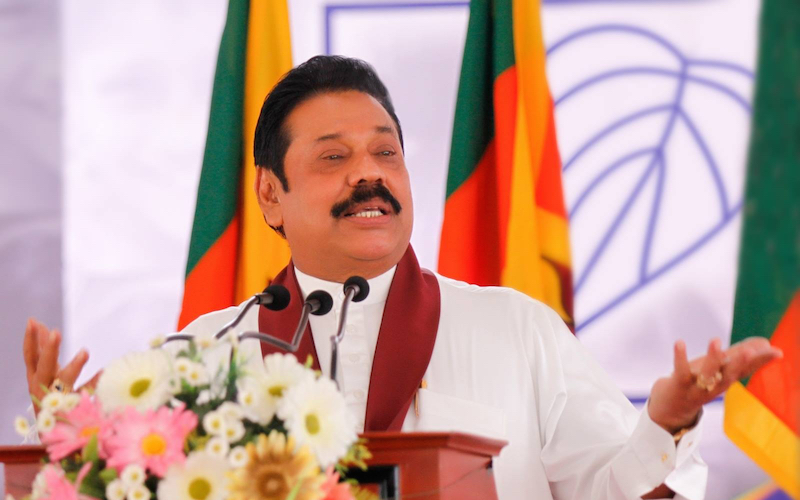
Sri Lanka’s Presidential Election: Four Things to Watch
Sri Lankans will go to the polls on January 8 to vote for their next president. This is an important election for the war-torn nation and incumbent President Mahinda Rajapaksa and his family have a great deal on the line. Rajapaksa has centralized power to a point where even many members of his own political party, the Sri Lanka Freedom Party, feel extremely isolated. The range of recent high-level defections, including that of his former health minister and principal challenger for the presidency, Maithripala Sirisena, reflects this. Indeed, there is a sense that nepotism and corruption have reached a level not seen before in modern Sri Lankan politics. The “common opposition” that hopes to defeat Rajapaksa includes erstwhile members of the ruling United People’s Freedom Alliance and the country’s main opposition party, the United National Party.
Rajapaksa called a snap election two years early – mainly because he had become increasingly unpopular and his ruling coalition had begun to weaken. Yet, when that announcement was made in late-November, Rajapaksa was the clear favorite.
A lot has changed since then.
That said, Rajapaksa has likely retained considerable support amongst the largely Sinhala-Buddhist electorate and he’s been able to use state resources to help with his reelection campaign.
This race could go either way, and for now, the only thing that appears certain is that uncertainty will remain the norm in coming weeks. Against this backdrop, here are four things to keep an eye on during Election Day.
1.) Military and police behavior: The fact that the Rajapaksa regime maintains a tight grip over key institutions, including the military and the police, means that Rajapaksa is likely to use state security personnel to intimidate voters (or worse). These well-founded concerns are especially serious in the northern and eastern provinces – places where the military’s presence remains particularly high and where Rajapaksa is unlikely to receive much support from voters.
There are post-election implications to consider as well – particularly if a defeated Rajapaksa were unwilling to accept the election results. In a recent report, the International Crisis Group succinctly summarizes this dilemma:
Even with monitors in place, opposition campaigners expect the full power of the state will be deployed against it over the next month, especially with the police and military under the direct control of the president and his brother, Defence Secretary Gotabaya Rajapaksa. Risks of serious violence will increase the stronger Sirisena’s challenge appears. The potential of extra-constitutional moves, possibly with the support of the military, will be particularly high immediately after the 8 January vote.
2.) The deal with minority voters: Even though the majority of Sri Lankans are ethnic Sinhalese, if the challenger Sirisena is going to defeat Rajapaksa, he really needs the support of Tamil and Muslim voters – the country’s two largest ethnic minorities. Rajapaksa’s policies have alienated both communities and Sirisena is widely expected to capture the vast majority of votes from both ethnic groups. Sirisena is running largely on a platform that focuses on good governance, abolishing Sri Lanka’s presidential system and moving to a parliamentary one, restoring the rule of law, and ensuring that key institutions, such as the judiciary, regain their independence. These are important issues, but concerns specific to minority voters (especially those of ethnic Tamils) have not been addressed. In spite of all this, leading Tamil and Muslim political parties have come out and endorsed Sirisena.
While it’s unsurprising that the campaigns of both Rajapaksa and Sirisena have catered to the largely Sinhala-Buddhist electorate, that makes it even more difficult to predict how things will play out. The opposition can expect to carry the preponderance of Tamil and Muslim votes, but, as we’ve heard so many times before, it’s going to come down to turnout – especially in the largely Tamil north and east.
3.) The Pope’s visit: Interestingly, the Vatican recently reiterated that Pope Francis’ January 13-15 visit to the island remains on schedule. This may seem perfunctory, but there continue to be well-founded worries that the regime will manipulate the Pope’s imminent arrival for electoral gain. More broadly, it sets a bad precedent internationally – as it violates the custom of not having a Pope visit a country a month before or after an election. The fact that Rajapaksa has suffered no consequences for disregarding this convention so conspicuously means that other leaders may not hesitate to ignore it. Lastly, the Pope’s imminent arrival could deter some post-election violence, but that may be wishful thinking.
4.) A dirty election and political violence: While most observers are not expecting for this be a fair election, it’s not clear how bad things could get. Violations of election laws and political violence have been getting steadily worse over the past few weeks – with the vast majority of violations being committed by Rajapaksa supporters. Domestic and international observers will be present on voting day, but how clean would this election have to be for it to be deemed free and fair? How many violations are too many? Might it get to a point where the international community fails to recognize the results of the election? If that happened, how might Rajapaksa respond? Alternately, what if Rajapaksa were to “win” but – in the eyes of Sri Lankans – the vote appears to be illegitimate? What would happen then?
Irrespective of who emerges victorious, uncertainty and volatility are likely to permeate Sri Lankan politics over the coming months. This is undoubtedly the toughest challenge Rajapaksa has faced since he first came to power in 2005. And, while it’s true that Sri Lanka has held elections since 1931, democratic space in the country has been shrinking for many years now. Essentially, under Rajapaksa’s watch, Sri Lanka has become an increasingly illiberal, deeply flawed democracy. It looks like that may be changing, but not necessarily for the better.
